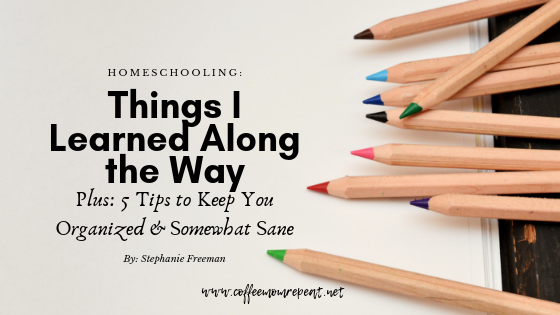When I started homeschooling, I really had no idea what I was doing or what to expect. All I knew is that I didn’t want to mess up my kid. I started with my son, Jacob, when he was going into third grade and then added his sister, Savannah, into the mix a couple years later (mostly to keep her busy while I worked with Jacob). I started out signing up with a school that had a homeschooling program that would test (such as the California Achievement Test), suggest curriculum, grade tests, send report cards, and keep transcripts for you. That really gave me the peace of mind and confidence I needed to take that first step and withdraw Jacob from public school. After a few years I felt confident enough to choose my own curriculum and explore what we could do on our own. Thus began our adventure into the sea of homeschool curriculum options.
I am by far no expert but hopefully the following things I learned from our 15 years of homeschooling will help you in your homeschool adventures.
1. Choose one curriculum publisher for 8th grade through high school.
This one I figured out after my son graduated high school. I would use Abeka one school year, then try LifePacs the next year, then Bob Jones, etc. Some children can handle that with no problem, but others can have a hard time adjusting to the way the different textbooks present the info and miss the topics altogether. Usually curriculum will build on/add to/flow with the last grade level (spiral approach). I found that if I settled on the same publisher from grade to grade, they seemed to absorb the info better and actually learn what they were studying. Sometimes skipping around like I did can also leave gaps in their education because not all publishers teach the same topics in the same grade level.
2. Keep your school schedule realistic and flexible.
In the beginning, when I would prepare lesson plans for the new school year, I would often fail to plan for field trips, sick days, etc. In the lower grades it was easy to take days off whenever we needed then just double up the next day or two to make up for it. That’s not so easy as they get into the higher grade levels. The work is harder and there is usually more of it. More chapters to read, more questions to answer, research to be done, etc. In our later years I started planning for 2-3 days a month off for the unexpected things that seemed to always come up. That is one of the many benefits of homeschooling though, you set your own schedule and do school whenever (and wherever!) you want to! Try to stay flexible with your school calendar and don’t get down on yourself if you do slip behind schedule a bit. It happens to the best of us and is not going to ruin your school year. Homeschooling allows us to teach our children as we see fit which means you don’t have to stick to the standard school calendar of Monday through Friday, August to June. Do whatever works best for your family.
3. Don’t overload on curriculum.
Every year, like a kid at Christmas, I would anxiously await my copy of the Rainbow Resource curriculum catalog to arrive in my mailbox. It was as big as a phone book and had everything you could ever want for your school year inside! I would spend weeks pouring over pages and pages of thousands of products dreaming about teaching my kids every subject and elective imaginable. I was in homeschool heaven! I realized very quickly though that whatever my children studied, I studied, and I could only do so much in a day! So, I had to scale back and focus on the core subjects with a few electives thrown in to keep things interesting. As they got older, I would pick out four or five electives for them and then let them choose two or three from there. It’s so easy to think you can do it all, but it will quickly lead to burnout for both you and your child.
4. Don’t fall behind on paperwork.
Grading. Ugh. I could not stand grading and would let it pile up way too long. If we had the money back then I’m pretty certain I would have hired someone to grade papers for me before I would have even thought about hiring a housekeeper! But, of course, grading is a necessary evil if you want to see how well your kids are comprehending their lessons so don’t let it go too long. Thankfully the state we schooled in did not have strict homeschool laws but I know some do and require turning in a sample of school work, registration papers, school calendars, etc. Those things sometimes have strict deadlines and consequences if they are not received on time or done correctly. Try to set aside time daily or weekly to get it done. If you need help or have any questions about your state’s laws and requirements refer to your state’s Department of Education website. Most have a Homeschool tab/section that will answer your questions or provide a number to call for help.
5. Find a homeschool group or co-op.
This one, for me, made all the difference in our homeschool. We were fortunate enough to have access to good homeschool groups and co-ops most everywhere we were during our homeschooling years. Some were focused solely on letting the kids and moms just chill and hang out, others were more organized and had activities, classes, field trips, and clubs. Joining a group helped my kids and I make new friends and allowed my kids to learn things I wasn’t able to or didn’t think to teach them. It also allowed them to go on more field trips than we were able to do on our own. Not a lot of places want to give tours to just three people. Not to mention going with a larger group was usually cheaper. I will say, exercise caution when choosing how often to participate in activities though. You don’t want to go and do so much that your kids fall behind in actual school work. Most state’s DOE/homeschool websites will have a list of the groups and co-ops in the state. If there isn’t one near you or one that meets your needs start your own! Check your state’s homeschooling website to see if there are any laws or regulations on starting a group then start asking around. Ask people at church or work or even strangers at the grocery store if they homeschool or if they know of anyone homeschooling that would be interested in meeting up. You never know, it could be the start of something huge!
Well, those are just a few things I could think of that I learned or could have done better during our homeschooling years. I’m sure if I took the time, I could think of many more things I could have done better or differently. But, no one is perfect, my kids survived and are now functioning adults, so I guess we did ok. You will no doubt have good days and bad days but just remember the reason you started homeschooling and stick to what works best for your family. I hope you found this helpful… Happy Homeschooling!

Stephanie Freeman is a former homeschool teacher and mother of two, with 15 years of trial and error under her belt. She enjoys spending time with her son, daughter, and granddaughter as well as relaxing on the beach whenever possible.
Coffee. Mom. Repeat. may earn a small commission via affiliate links in this post. You can view our whole disclosure policy HERE.




